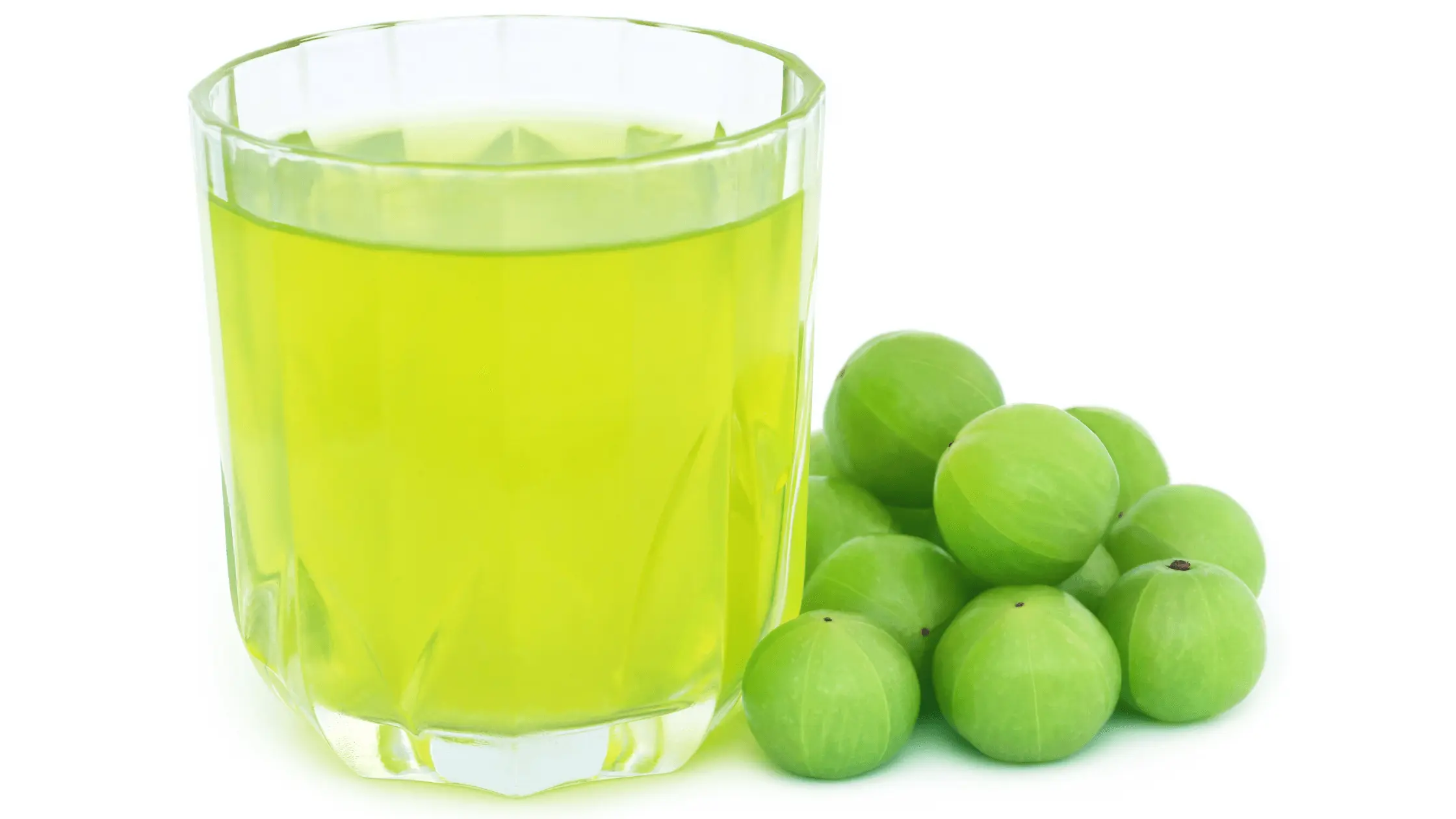


Weight loss is becoming a popular activity in young people. People want to lose their weight in order to look smart and attractive. However, different people use different approaches to lose their weight. Weight loss diet plan is one of the best approach to achieve this goal. Most of the time people found in confusion that which food is right to incorporate in their weight loss diet plan. Our today’s article is on the same topic. Many people ask different queries regarding amla juice. Most commonly query that we receive “Is amla juice good for weight loss?”
This article delves into the effectiveness of amla juice as a natural remedy for weight loss, exploring its numerous benefits, recommended usage, and potential side effects. People after reading this article will be able to make the decision that weather amla juice is good for weight loss or not. So let’s start by reading basic overview of amla.
Amla juice, also known as Indian gooseberry juice, is a popular Ayurvedic herbal remedy made from the fruit of the Amla tree (Emblica officinalis). It has been used in traditional Indian medicine for centuries due to its perceived health benefits. Amla juice is believed to boost immunity, provide antioxidant effects, and support digestive health. It is rich in nutrients and is particularly known for its high vitamin C content. Many people consume amla juice for its potential health-promoting properties and weight loss.
It is packed with iron, calcium, fibre, and vitamins C, E, and A and is renowned for its potential health benefits. Amla is an excellent source of essential vitamins, enhancing the immune system.
Amla, scientifically known as Emblica officinalis or Phyllanthus emblica, is a fruit native to the Indian subcontinent. It has been highly valued for centuries in traditional Ayurvedic medicine for its medicinal properties and therapeutic benefits. Amla holds a significant place in Indian culture and is often referred to as the “Indian gooseberry.”
The historical significance of amla can be traced back to ancient Ayurvedic texts, where it is praised for its rejuvenating and healing properties. It has been traditionally used to treat various ailments, boost immunity, improve digestion, and promote overall well-being. Amla has also been incorporated into culinary preparations, such as chutneys and pickles, due to its tangy flavor and nutritional value.
Amla juice is highly regarded for its exceptional nutritional profile. It is a rich source of vitamins, minerals, and antioxidants, which contribute to its numerous health benefits. Here is an overview of the key nutrients found in amla juice:
The combination of these vitamins, minerals, and antioxidants in amla juice makes it a nutrient-dense beverage that can support overall health and well-being. The nutritional composition may vary slightly depending on the ripeness and preparation method of the amla fruit or juice.
Amla juice has gained recognition as a potential aid in weight loss due to its various properties that can support a healthy and effective weight management journey. Let’s explore how amla juice can contribute to weight loss:
Amla juice is known to stimulate the metabolism, which is the process by which the body converts food into energy. A higher metabolic rate means the body burns calories more efficiently, resulting in increased energy expenditure and potential weight loss. Amla juice contains Vitamin C, which plays a crucial role in enhancing metabolic functions and promoting fat oxidation.
Amla juice acts as a natural appetite suppressant, helping to control food cravings and reduce calorie intake. The high fiber content in amla juice contributes to a feeling of fullness, preventing overeating and unnecessary snacking. By curbing appetite and promoting satiety, amla juice can support calorie restriction, a key component of weight loss.
Good digestion is essential for effective weight management. Amla juice aids digestion and promotes the absorption of nutrients. It contains digestive enzymes that help break down food and improve nutrient assimilation. Healthy digestion ensures proper nutrient utilization, prevents bloating, and supports the elimination of waste, all of which can contribute to weight loss.
Amla juice possesses detoxifying properties that can aid in weight loss efforts. It helps in flushing out toxins from the body, optimizing liver function, and supporting the body’s natural detoxification processes. By eliminating toxins and waste, amla juice can help improve overall well-being and potentially assist in shedding excess weight.
The antioxidant properties of amla juice play a significant role in weight loss. Antioxidants combat oxidative stress, reduce inflammation, and support overall health. By reducing inflammation, amla juice may help prevent weight gain associated with chronic inflammation. Additionally, antioxidants promote a healthy metabolism and contribute to overall cellular health, which can facilitate weight loss.
Amla juice can be a beneficial addition to a weight loss regimen, it is not a magic solution on its own. To achieve sustainable weight loss, it is essential to combine amla juice with a balanced diet, regular physical activity, and overall healthy lifestyle practices.
Amla juice offers numerous benefits that can aid in weight loss and contribute to a healthier body. Firstly, amla juice is low in calories, making it a suitable choice for individuals looking to manage their calorie intake. By incorporating amla juice into their weight loss plan, individuals can enjoy its nutritional benefits without significantly increasing their calorie consumption. Additionally, amla juice is rich in dietary fiber, which plays a crucial role in weight management. The fiber content in amla juice promotes satiety and helps control hunger cravings, preventing overeating and supporting portion control. Moreover, amla juice contains essential nutrients like Vitamin C, which can boost metabolism.
A higher metabolic rate can increase the body’s calorie-burning capabilities, aiding in weight loss. Furthermore, amla juice possesses detoxifying properties that assist in weight loss efforts. It helps eliminate toxins from the body, supports liver function, and optimizes the body’s ability to eliminate waste. Additionally, the antioxidant properties of amla juice, including Vitamin C and polyphenols, reduce oxidative stress and inflammation in the body. By reducing inflammation, amla juice creates a healthier environment for weight loss. Lastly, amla juice supports overall well-being by boosting the immune system, promoting healthy skin, and providing essential nutrients for sustained energy levels. While amla juice can be a valuable addition to a weight loss regimen, it is important to remember that it should be combined with a balanced diet, regular exercise, and a healthy lifestyle for optimal results.
Here’s a step-by-step guide on how to make and use amla juice for weight loss goals:

Remember, amla juice is a supplement to a healthy lifestyle and should not be considered a quick fix for weight loss.
Let discuss the suitable daily dosage of amla juice. The optimal dosage may vary depending on factors such as age, overall health, and individual needs. Here are some general recommendations:
It is worth mentioning that amla juice is acidic in nature, so it is important to protect your tooth enamel. After consuming amla juice, rinse your mouth with water or brush your teeth to minimize the impact of acidity on dental health.
Lastly, amla juice is a supplement to a healthy lifestyle and should not be used as a replacement for a balanced diet or medical treatment. It is advisable to incorporate amla juice into a well-rounded approach to weight loss that includes a nutritious diet, regular exercise, and overall healthy habits.
While amla juice is generally safe for consumption, it is important to be aware of potential side effects and interactions. Here are some possible considerations:
In addition to its potential for weight loss, amla juice offers various other health benefits. Let’s explore some of these benefits:
Is Anjeer Good For Weight Loss?
Testosterone And Constipation: Exploring The Relationship
Is Sugarcane Juice Good For Weight Loss?
Amla, also known as Indian gooseberry, is indeed good for weight loss. Amla is low in calories, making it an ideal addition to a weight loss diet. It is also high in dietary fiber, which helps promote feelings of fullness and satiety, preventing overeating and aiding in portion control. The fiber in amla supports healthy digestion and regulates bowel movements, contributing to overall weight management. Additionally, amla is rich in antioxidants, particularly Vitamin C, which can help boost metabolism and support fat burning. Amla’s antioxidant properties also help reduce inflammation in the body, which is beneficial for weight loss as chronic inflammation can hinder weight management efforts.
Moreover, amla has a low glycemic index, meaning it does not cause a rapid increase in blood sugar levels, making it suitable for individuals who need to manage their blood sugar levels while trying to lose weight. Including amla in your diet can provide essential nutrients while keeping calorie intake in check, supporting weight loss goals. However, it is important to note that amla is not a magical solution for weight loss on its own. It should be part of a balanced diet and a healthy lifestyle that includes regular physical activity.
A: It is important to consult a healthcare professional before adding it to your diet. The amount can depend on the form of amla you are taking and your health requirements and objectives. Generally, the recommended dosage is 30-50ml per day. It is usually best to have the juice on an empty stomach in the morning or before meals.
A: Consuming amla juice daily in moderate amounts is generally safe. However, due to its high vitamin C content, it may interfere with the absorption of certain medications, so it is best to consult a healthcare professional before adding it to your diet to determine an ideal daily dose.
A: Drinking amla juice daily may provide many potential benefits, such as better metabolism and fat burning due to its high vitamin C content. Additionally, amla is a good source of fibre, promoting feelings of fullness and, thus, weight loss. Its rich antioxidant content has anti-inflammatory properties, which may help strengthen the immune system and ward off illnesses. Amla is also thought to have anti-ageing effects and may improve the appearance of wrinkles and blemishes.
A: Amla is an excellent food for weight loss, as it is high in vitamin C, which helps to increase metabolism and burn fat in the body. It also contains a good amount of fibre, which can help to keep you feeling full and reduce hunger cravings, leading to a natural decrease in calorie intake. Additionally, it is rich in antioxidants and anti-inflammatory properties, contributing to its weight loss effects.
A: Consumption of amla juice can lead to gastrointestinal upset, such as stomach pain, nausea, and diarrhoea. People with diabetes should be aware that amla juice may cause their blood sugar levels to drop and should monitor their levels closely. Additionally, medications such as blood thinners and blood-sugar-lowering drugs could be adversely affected by amla juice, so anyone taking medications should speak with a healthcare professional before adding it to their diet.